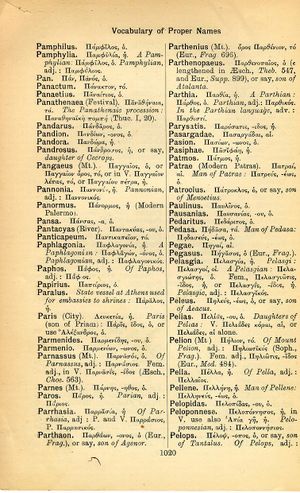Parthaon
ποταμῷ γὰρ οὐκ ἔστιν ἐμβῆναι δὶς τῷ αὐτῷ → it is impossible to step twice in the same river, you cannot step twice into the same rivers
English > Greek (Woodhouse)
Παρθάων, -ονος, ὁ (Eur., Frag.), or say, son of Agenor.
Latin > English (Lewis & Short)
Parthāon: ŏnis, m., = Παρθάων,
I son of Agenor and Epicaste, king of Calydon, and father of Œneus: ego te simitu novi cum Parthaone, I know you as well as I do Parthaon, i. e. not at all, Plaut. Men. 5, 1, 45: Parthaone nate, i. e. Œneus, Ov. M. 9, 12; cf. Hyg. Fab. 175; 239 and 242.—Hence,
A Parthāŏnĭdes, ae, m., a descendant of Parthaon: Parthaonides dux, i. e. Tydeus, the grandson of Parthaon; acc. to others, Meleager, the brother of Tydeus, Val. Fl. 3, 705.—
B Parthāŏnĭus, a, um, adj., Parthaonian: Parthaonia domus, the house of Œneus, Stat. Th. 1, 670.

